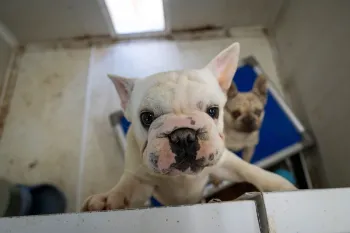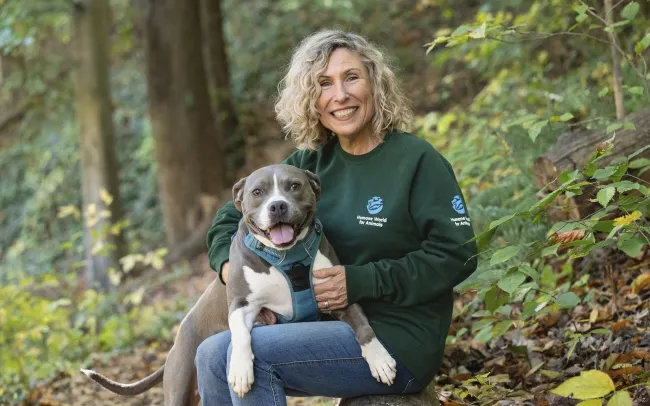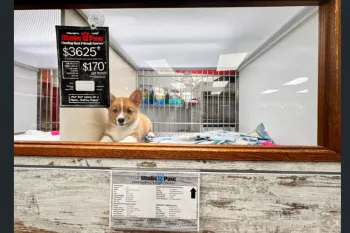Macey Mullins bought a little Jack Russell terrier from a Petland store in Ohio in 2020. According to Mullins, when she purchased the dog, she was assured that the dog was healthy, had been examined by a veterinarian and had come from a responsible, small-scale breeder. Mullins named her new dog June. Shortly after they arrived home, June seemed constantly thirsty and was urinating excessively, Mullins said, and when she followed up with Petland, Petland claimed this was normal puppy behavior.
So much of the cruelty we confront in our work involves thousands, millions or even billions of animals suffering or dying in particular contexts. Even so, nearly every animal’s individual story speaks to the larger picture of animal neglect and suffering at human hands. That is certainly the case with June.
June’s behavior wasn’t normal: Just months later, June was receiving veterinary care for bilateral renal dysplasia, a congenital kidney condition, and what she could consume came intravenously. Finally, after thousands of dollars in veterinary care fees, and no prospect for recovery, a heartsick Mullins decided that euthanasia was the most compassionate way to relieve June’s suffering.
If you know even a little about the pipeline from puppy mills to pet stores, you know that there are more stories like June’s than there are days in a year—or a decade. The misery of animals is just a cost of doing business for puppy mills, where mother dogs churn out litters and litters of puppies, while the pet stores profit from selling them. The heartache and veterinary expenses are passed on to customers like Mullins. The real cost is borne by animals like June in the form of congenital disease, poor health and tragically shortened lives.
When we chose puppy mill cruelty as a core priority for our organization to address, we identified the sale of puppies at pet stores as the point of pressure where we could put a stop to the cruelty.
The sale of a puppy mill puppy from a pet store is a transaction that conceals the everyday cruelties of puppy mills, where dogs languish in cramped, dirty and bare enclosures, often without adequate protection from the elements. Largely invisible to the public, puppy mills tend to be ramshackle and isolated facilities tucked away on backroads, with only the occasional federal or state inspection report to give a glimpse of the wanton disregard for animals’ well-being.
Many stores do not list a puppy’s price on their websites, and some won’t even reveal the price over the phone; instead, they tell interested customers to come into the store. There, at the pet store, the positive emotions people experience at the sight of puppies for sale leave them vulnerable to misrepresentations about the animals’ origins, hollow and baseless assurances about their health, and financing rates so exorbitant they would make even a loan shark blush.
No one deserves to be duped, and so we have stood up for people whose enthusiasm for bringing a puppy into their home led them into situations in which they became victims of fraud and deceit. In all our campaigns, we make existing law work for animals, and consumer protection law represents a strong channel for redress. In recent years, working with local counsel, our Animal Protection Law team has assisted plaintiffs in lawsuits seeking to hold pet stores, such as those owned or franchised by national puppy-selling chain Petland, accountable for the harm they cause to animals and to their unwitting customers.
Our Animal Rescue Team responds on a regular basis to large-scale cruelty cases involving alleged puppy mills, and we make sure to share our findings with the public, with the media and with lawmakers. We do the same for our undercover investigations, helping to expose the cruel reality of life inside a puppy store, for scared, often sick, weeks-old puppies. Frequently, these investigations support our policy work, as was the case in Nevada this year, where Cindy Lou’s story fueled our campaign for the state bill to stop the sale of puppies in pet stores.
The passage of state laws and local ordinances is essential for long-term change, and our State Affairs and program teams are essential in making this happen. With eight states and over 500 localities banning the sale of puppies in pet stores, and many more to come, puppy mills are seeing their sales outlets (and thus profits) diminish. Our Animal Protection Law team has played a crucial role in fortifying the measures introduced in state legislatures and local municipalities. We help to defend those laws post-enactment, too. In instances when these local and state pet store laws have been challenged in court, not one has been struck down. Currently, Delaware’s Humane Pet Store Bill (HB 131) passed unanimously out of committee and heads to the House floor, and we’re determined that this will be yet another law on the books to crack down on the puppy mill industry.
Two U.S. federal bills, supported by our Federal Affairs team, could be gamechangers for puppies in puppy mills, too: The Better Collaboration, Accountability and Regulatory Enforcement (CARE) for Animals Act (H.R.3112/S.1538) and the Puppy Protection Act (H.R.2253). Each gained more than 200 bipartisan co-sponsors in the House in the last session of Congress (the 118th), and we continue to champion them both.
The federal Animal Welfare Act is meant to protect animals in puppy mills, roadside zoos and research facilities. Yet repeat offenders who continue to violate basic standards of animal care in these facilities face little to no consequences. The Better CARE for Animals Act would give the U.S. Department of Justice the tools to collaborate more effectively with the U.S. Department of Agriculture to enforce the law.
Under the Animal Welfare Act, large-scale commercial dog breeders who sell to pet stores, brokers or online must obtain a USDA license, undergo regular inspections and comply with standards of care. The Puppy Protection Act would require significant improvements of these standards of care, including spacious dog runs, solid flooring instead of wire that injures dogs’ paws, better protection from severe weather, feedings at least twice per day and prompt medical care by a licensed veterinarian. Additionally, breeders must make a reasonable effort to find retired breeding dogs a home or placement with a rescue organization instead of just killing them.
In Congress, one of the most important fights for dogs in 2025 and 2026 will center on continued funding for USDA inspections. While the USDA’s oversight can be spotty or flawed, the fact is that these inspections are necessary, and they frequently provide the evidence needed to fight for legislation at the state and federal levels to better protect dogs in puppy mills. That’s why we put so much pressure on the USDA to restore the animal welfare inspection reports taken down in 2017, and it’s why we put so much time and energy into our annual Horrible Hundred reports to amplify findings of these reports and expose puppy mills for what they truly are.
Our work to put an end to puppy mills is a team effort in the fullest sense, and we’re giving puppy millers and their allies, including Petland and the American Kennel Club, a run for their money. Puppies like June and thousands of others are not merely commodities. And we’re determined to spare tens of thousands of other animals from the same sad fate. We won’t ever let those responsible for so much animal suffering off the hook.
Sara Amundson is president of Humane World Action Fund.
Goodboy Picture Company/Getty Images
Tell us about your pets
At Humane World for Animals, everything we do is inspired by the animals we share our lives with and the people who care for them which is why we would love to hear about your pets.




